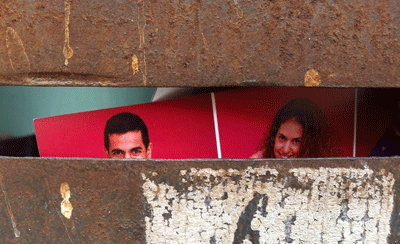Sweating Knights
Is the art world too exclusive?
Is the art world too exclusive?

… so I’m in the buffet car on the train, and there are knights at the next table. Not in shining armour, have no fear, but smartly dressed nonetheless – members of the Order of St. John, on their way home from a Knights’ Ball. It’s not every day you get to eat with nobility, so I did some eavesdropping. One of them was high-ranking, responsible for selecting the right people to join the Order. ‘This isn’t easy’, he said, ‘recommendations are always good, while unsolicited applications are a bad sign.’ At the Ball, one such applicant had drunk his beer from the bottle! Disqualified! ‘We all drink beer out of the bottle from time to time,’ said the knight’s wife. ‘You just need know where not to do that.’ Nothing’s explicitly forbidden, but there’s an ‘unwritten catalogue of criteria’; those who don’t know it exclude themselves from the circle of those who do.
Ludicrous? Or does it concern us, too? A secret Germany does exist – not only in the minds of knights but also in art circles. The pages of the unwritten catalogue rustle: Him, yes, but not her. You want to come in? To join us, to be part of art? Act as if you were in already. If you do it well, then you will be. Never apply. Have yourself summoned. Don’t submit a portfolio. Act like nobility. Only recommendations ennoble. Quietly pray: ‘Let me mount to your height, / Summit, and not be destroyed!’ Stefan George – the German Baudelaire and elite cult priest par excellence – penned these lines for his poem Geheimes Deutschland (Secret Germany, 1928).

(Photograph: Jan Verwoert)
Pretty gross. But the stuff of dreams for so many! In Operation Valkyrie (2008), for example, Tom Cruise wanted to wear von Stauffenberg’s eyepatch at all costs. The Prince of Scientology slipping into the skin of the Stefan George disciple to celebrate the revolt of the radical conservative elite against the parvenu Hitler. Conspirators at the time included many Knights of St. John, and Stauffenberg’s last words were a salute to George: ‘Long live the secret Germany’. Cringe. Sorry, Tom, your film was rather uncool. We’re not letting you in with that.
The same thing just happened to me. We’d played a gig with our band in Geneva. The next evening I went back to the club to collect our fee. Arriving early, I found three women standing inside in lingerie and lace. Before I could blink an eye, one of them looked me in the face and said: ‘You’re not on the guest list’. My eyes obviously weren’t widely enough shut. Nevermind. I went round the corner to the Hotel Beau Rivage, got into the bathtub with the ghost of Uwe Barschel and said: ‘Hey Uwe, good that you don’t need lists to haunt!’ I forgot to ask him why, in 1987, he, a German minister-president, would have checked in to die at the same hotel outside which Empress Elisabeth of Austria (Sissi) was stabbed to death in 1898. Another time.
A few days later, I was jogging on the banks of Lake Michigan. Early morning runners in Chicago show as much skin as Geneva professionals by night. But participation in this ritual is free of charge. The lake is right there. Anyone who comes here to run is cheerfully greeted by the other joggers, as if he belonged to the same club. I’ve experienced the same thing in the park in Brooklyn. The American dream is lived afresh, over and over: emigrants flee the class conditions of the Old World and take pleasure in their liberated bodies in the New. Sport is the medium for arriving together in the here and now. Sweat unites.
Would Marx have liked this concept of sweating together in the spirit of liberty? Probably. In the Paris manuscripts of 1844, his remarks on the joys of life beyond capitalist possessiveness and class domination culminate in his assertion that ‘the abolition of private property is therefore the complete emancipation of all human senses and qualities.’ In other words: as long as we understand experience as property and distinguish between mine and yours, we treat sensuality as capital. And George’s geniuses remain the secret landowners of the mind. How tedious! Marx had more going on. He dreamt of liberated bodies whose senses would be ‘social organs’, of a society shaped in the spirit of such sensuality. When experience becomes common property, an unfettered sensus communis suspends the unwritten laws of the elites, and the social sweats from every pore. Bohemian society has continued to dream Marx’s dream, especially in America. In his poem Stotras to Kali Destroyer of Illusions (1962), Allen Ginsberg unceremoniously relocated the sacred grove of the New World to the public toilets in the basement of the Empire State Building. That’s where we should invite the knights for their next meeting! I’ll gladly deliver the welcoming address:
Welcome to the washrooms at the hub of the world. Secrets are free. For here sweateth the commune. Come let us celebrate its organs, ad salutem populi!
Translated by Nicholas Grindell















